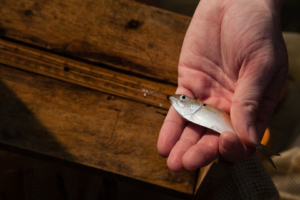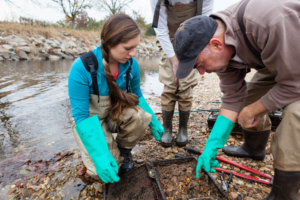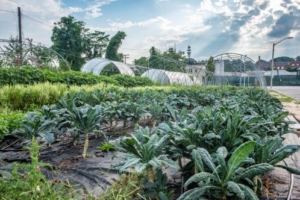Study Predicts Heavier Rains for Five Eastern Shore Towns
 A new study conducted by researchers from the University of Maryland gives a detailed look into how climate change will influence extreme storm rainfall in Maryland’s Eastern Shore. Overall, their findings suggest that by the mid-21st century, a 100-year storm will bring heavier and more intense rainfall, if the world does not curb its greenhouse gas emissions. The study makes specific rainfall depth forecasts for five Eastern Shore towns: Cambridge, Centreville, Denton, Easton, and Elkton. This information could help city officials plan stormwater projects and make the right preparations for infrastructure that is impacted by extreme precipitation, such as roads and bridges. The research was highlighted in a report by the Eastern Shore Land Conservancy.
A new study conducted by researchers from the University of Maryland gives a detailed look into how climate change will influence extreme storm rainfall in Maryland’s Eastern Shore. Overall, their findings suggest that by the mid-21st century, a 100-year storm will bring heavier and more intense rainfall, if the world does not curb its greenhouse gas emissions. The study makes specific rainfall depth forecasts for five Eastern Shore towns: Cambridge, Centreville, Denton, Easton, and Elkton. This information could help city officials plan stormwater projects and make the right preparations for infrastructure that is impacted by extreme precipitation, such as roads and bridges. The research was highlighted in a report by the Eastern Shore Land Conservancy.
Increased Storm Surge for the Chesapeake Bay
 Oceanographers from the University of Maryland Center for Environmental Science are shedding light on how climate change and environmental action might impact future storm surge in the Chesapeake Bay. In a recent study, the scientists ran simulations to predict how ocean warming, sea level rise, and coastline management will influence severe storm flooding in this bay by 2050 and 2100, using Hurricane Isabel as a case study. Their models suggest that by 2100, ocean warming could amplify storm surge by up to 1 foot. The models also found that if coastal communities harden their shorelines, such as through seawalls and bulkheads, storm surge could further increase by roughly 4 inches in much of Chesapeake Bay. This research could better inform coastal districts as they explore different strategies for managing flooding around the bay.
Oceanographers from the University of Maryland Center for Environmental Science are shedding light on how climate change and environmental action might impact future storm surge in the Chesapeake Bay. In a recent study, the scientists ran simulations to predict how ocean warming, sea level rise, and coastline management will influence severe storm flooding in this bay by 2050 and 2100, using Hurricane Isabel as a case study. Their models suggest that by 2100, ocean warming could amplify storm surge by up to 1 foot. The models also found that if coastal communities harden their shorelines, such as through seawalls and bulkheads, storm surge could further increase by roughly 4 inches in much of Chesapeake Bay. This research could better inform coastal districts as they explore different strategies for managing flooding around the bay.
Fishing Pressure Results In Faster Atlantic Menhaden Growth

A research technician holds an Atlantic menhaden after it was measured during a seining study at UMCES’ Chesapeake Biological Laboratory. (Photo by Will Parson/Chesapeake Bay Program)
A new study involving the University of Maryland Center for Environmental Science has found that fishing activity in the Atlantic Ocean impacts the size of menhaden, an abundant forage fish that is an important aspect of ecosystem food webs and several commercial products. The researchers involved in the study analyzed records that have documented coast-wide annual growth of Atlantic menhaden for the last 55 years. They found that fishing pressure positively influenced the menhaden length-at-age, suggesting that increased commercial fishing reduced competition for resources among fish populations, allowing individual fish to grow at a faster rate.
Reintroducing Freshwater Mussels in the Anacostia Watershed

Rachel Harrison, left, and Dr. Lance Yonkos of the University of Maryland examine freshwater mussels in Riverdale, Md. Harrison studied the impact of contaminants on mussels in the Anacostia River watershed. (Photos by Will Parson/Chesapeake Bay Program)
Freshwater mussels play an important role in ecosystem health by filtering water, but they are sensitive to contamination and cannot survive in heavily polluted waters. A recent study led by University of Maryland researchers assessed the potential for reintroducing eastern elliptio mussels in the Anacostia River’s tributaries. This watershed has been recovering from decades of pollution and habitat degradation. The research team relocated eastern elliptio mussels from a healthy wetland in southern Maryland to six sites in the Anacostia. The scientists found that the mussels were still healthy after five months in the watershed, a good sign that this species could possibly return to its old habitat.
Growing a More Sustainable Future In the Chesapeake Bay

An urban farm in Baltimore, Md. Credit: Edwin Remsburg Studios
The Hughes Center and the University of Maryland College of Agriculture and Natural Science (AGNR) have partnered with several other institutions on a groundbreaking study into the future and sustainability of Chesapeake Bay area agriculture. Lead by Penn State researcher, David Abler, the project has been named “Thriving Agricultural Systems in Urbanized Landscapes” and is funded by a $9 million dollar grant awarded by the U.S. Department of Agriculture’s National Institute of Food and Agriculture. The study aims to offer insight into the next 25 years of agriculture in the region. UMD’s role is to lead outreach, soil health, nutrient management, and water quality efforts. Gurpal Toor, professor at AGNR, is the grant team’s expert on nutrient management and water quality. According to Toor, a large part of the project is to provide farmers with best management practices to ensure a sustainable future. With the current pandemic already highlighting some of the issues in our current system of food supply, this research is incredibly vital as we move forward into a future with many unknowns.
